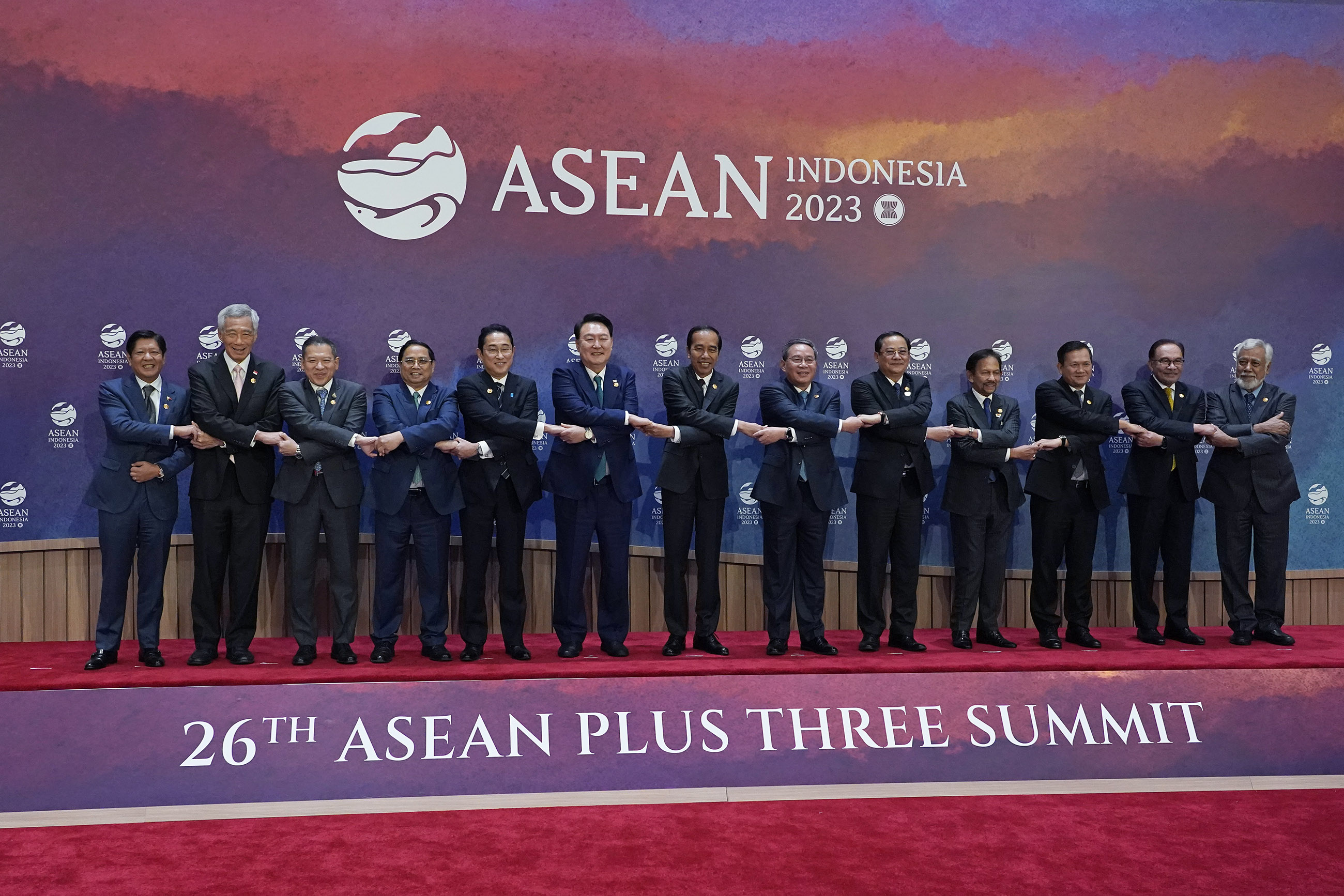The 26th ASEAN Plus Three (Japan-China-Republic of Korea) Summit (Summary)
September 6, 2023
[Provisional translation]
On September 6, commencing at 1:30 p.m. local time (3:30 pm, JST) for about 80 minutes, the 26th ASEAN Plus Three (Japan-China-Republic of Korea) Summit was held in Jakarta, Indonesia. Mr. KISHIDA Fumio, Prime Minister of Japan, attended the meeting. The overview of the meeting is as follows.
- Opening Remarks
At the outset, Prime Minister Kishida stressed the importance of upholding and reinforcing the free and open international order based on the rule of law in order for the Indo-Pacific region to remain an “Epicentrum of Growth.” Prime Minister Kishida outlined Japan’s following initiatives, expressing Japan’s consistent support for ASEAN centrality and unity, and the mainstreaming of the ASEAN Outlook on the Indo-Pacific (AOIP).(1) Actively led discussions including on the swift creation of the rapid financing facility to further strengthen the Chiang Mai Initiative Multilateralization (CMIM);(2) Provided assistance through the ASEAN+3 Emergency Rice Reserve (APTERR); and(3) Provided 3.3 billion US dollar worth of emergency financial support loans to help recover from the COVID-19 pandemic.
- ASEAN+3 Cooperation
(1) Prime Minister Kishida emphasized that Japan would continue to promote concrete cooperation in the four priority areas of the AOIP as follows.- Maritime cooperation: Supporting the training of Vessel Traffic Service (VTS) operators as well as the implementation of measures against marine plastic debris.- Connectivity: Announced the Japan-ASEAN Comprehensive Connectivity Initiative today in order to further strengthen connectivity in both hard and soft aspects.- SDGs: Supporting the following efforts to overcome the various challenges faced in achieving this goal;● Support for the APTERR, contribution to strengthening the organization of the ASEAN Food Security Information System (AFSIS), and the launch of the “Japan-ASEAN MIDORI Cooperation Plan” to build a resilient and sustainable agriculture and food system;● Support for the early operationalization of the ASEAN Centre for Public Health Emergencies and Emerging Diseases (ACPHEED); for the early operationalization of the ASEAN Centre for Public Health Emergencies and Emerging Diseases (ACPHEED);- Economy and finance: Contributing to strengthening the financial resilience against disaster risks, to developing Asian bond markets, and to the discussions on the opportunities and challenges of financial digitalization in the region.(2) Other participating countries made remarks on their priority areas of cooperation including their own initiatives, post-pandemic economic recovery, health, food security, financial cooperation and digital economy.
- Regional and international issues
(1) Prime Minister Kishida expressed his serious concern over North Korea's intensified nuclear and missile activities, and stressed that it is essential for the international community to be united and fully implement UN Security Council Resolutions (UNSCRs) in order to achieve the complete, verifiable, and irreversible dismantlement (CVID) of all of North Korea’s weapons of mass destruction and ballistic missiles of all ranges. He also called for continued understanding and cooperation toward the immediate resolution of the abductions issue. In addition, Prime Minister Kishida expressed grave concern about the situation in Myanmar, reiterated his call for the Myanmar military to grant safe and unhindered humanitarian access, and stated that he would continue to support ASEAN's efforts to resolve the situation.(2) Other participating countries touched on the situation in Myanmar and the importance of the denuclearization of the Korean Peninsula.(3) Prime Minister Kishida explained that the discharge of ALPS treated water into the sea has been conducted in accordance with international standards and practices, and that the IAEA Comprehensive Report states that the radiation impact on humans and the environment is negligible. He explained that the data monitored since last month's discharge has been made public in a prompt and highly transparent manner, and that no problems have arisen from a scientific standpoint. He explained that the reliability of the data would be confirmed objectively with the involvement of the IAEA and analytical institutions of third countries. He then stated that these points are widely understood by the international community, but that China has been taking uncommon actions, such as suspending all imports of Japanese marine food products in response to the recent discharge into the sea, and that Japan would continue to call on actions based on scientific evidence and dissemination of accurate information. He also stated that Japan would continue to work closely with the IAEA and to provide explanations to the international community based on scientific evidence in good faith and in a highly transparent manner.
- Closing Remarks
Prime Minister Kishida expressed his determination to strengthen cooperation under ASEAN+3 so that ASEAN will take the lead in efforts to uphold and reinforce the free and open international order based on the rule of law.
